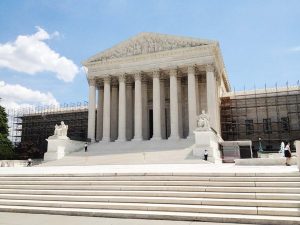
By Dave Workman
Editor-in-Chief
The U.S. Supreme Court has announced it will hear a Second Amendment case challenging New York State’s carry law that could expand on the right to bear arms, opening the door to what could be a major impact on restrictive gun laws in several states.
This underscores the importance of Donald Trump’s ability to fill federal court vacancies with constitutional jurists during his tenure.
The case is known as New York State Rifle & Pistol Association v. Corlett, and it will be argued this fall. It is the first time in more than a decade the high court will review a gun rights case.
The Second Amendment Foundation hailed the announcement. SAF founder and Executive Vice President Alan Gottlieb said it is certain the current makeup of the high court has opened an important door.
With the addition last year of Associate Justice Amy Coney Barrett to fill the vacancy created by the passing of Ruth Bader Ginsburg, the court now has a majority of constitutional jurists who will no longer treat the Second Amendment as “a constitutional orphan,” as once observed by Associate Justice Clarence Thomas, SAF suggested in a prepared statement.
“This case was made possible by the Second Amendment Foundation’s Supreme Court victory in McDonald v. City of Chicago that incorporated the Second Amendment to the states via the 14th Amendment,” Gottlieb observed. “SAF’s victory in that case built the foundation for this and other lawsuits against states and localities to be heard by the Supreme Court to protect and expand gun rights, and we are proud of that.”
The stage is set for what could be a major constitutional confrontation with the carry laws in other states, such as New Jersey, Maryland, California and Hawaii.
The Second Amendment protects not just a right to keep arms, but to bear them, which gun rights advocates insist means outside the home, in public. Nineteen states have so-called “Constitutional Carry” laws that allow the carrying of firearms without a permit or license. Most other states have what are generically called “shall issue” statutes that require agencies to issue concealed carry licenses, without discretion; that is, issuing agencies cannot arbitrarily deny someone a license.
According to NBC News, there is strong sentiment on the high court in favor of accepting a case. Last year, the court declined to review a restrictive law in New York City that forbade owners of licensed handguns to transport them outside of the city. When the court initially announced it would hear that case, the city scrambled to change the law, an indication many believe signaled the city’s acknowledgement the restriction was unconstitutional. As reported by NBC, “Justices Thomas, Samuel Alito, and Neil Gorsuch said the court should have decided that case and declared the restriction unconstitutional. Another of the court’s conservatives, Brett Kavanaugh, said then that the court should address the larger Second Amendment issue by taking up other challenges to gun restrictions, such as on carrying guns outside the home.”
The 2008 Heller ruling, striking down the handgun ban in the District of Columbia, only affirmed the Second Amendment protects the right to keep a gun in the home for protection. It did not address the larger right-to-carry (bear arms) and in the past dozen years, anti-gunners have argued the right only applies to someone’s home. Gun rights advocates call that argument nonsense.
In their opening argument asking for review, plaintiffs observe, “Perhaps the single most important unresolved Second Amendment question after this Court’s landmark decisions in District of Columbia v. Heller…(2008), and McDonald v. City of Chicago…(2010), is whether the Second Amendment secures the individual right to bear arms for self-defense where confrontations often occur: outside the home. The text, history, and tradition of the Second Amendment and this Court’s binding precedents compel the conclusion that the Second Amendment does indeed secure that right.”
In a statement for the media, SAF’s Gottlieb noted, “The entire gun rights community has waited for many years for this news. A right that exists only in one’s home is not a right at all. We do not limit the right of free speech, or freedom of the press, or the practice of one’s religion, or the right to legal counsel just to someone’s residence. And ultimately, that’s what we’re talking about, constitutionally-protected fundamental rights.”
A version of this story also appears in Liberty Park Press.



